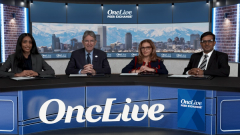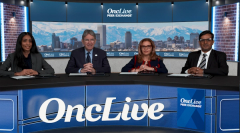
Transplant Complications and Survival Outcomes
Analyze risks and complications associated with allo-HSCT, including graft-versus-host disease, infections, relapse, and regimen-related toxicities.
Episodes in this series

This is a video synopsis/summary of a Peer Exchange featuring Miguel-Angel Perales, MD; Nelli Bejanyan, MD; Amandeep Salhotra, MD; and Arpita Gandhi, MD, MS.
The panel discusses the importance of considering outcomes beyond traditional measures such as overall survival and relapse-free survival when evaluating the success of allogeneic hematopoietic stem cell transplantation (allo-HSCT). While these metrics have been the primary focus in the past, patients are often more concerned with their ability to return to their normal lives after transplantation.
Newer composite end points, such as graft-vs-host disease–free, relapse-free survival, provide a more comprehensive assessment of transplantation outcomes by incorporating acute and chronic graft-vs-host disease in addition to relapse-free survival. This composite end point has become a new standard for measuring outcomes in clinical trials.
The panel emphasizes the importance of using these composite end points, particularly in ongoing clinical trials, to better capture the patient experience and provide a more accurate representation of the overall success of transplantation.
Video synopsis is AI-generated and reviewed by OncLive® editorial staff.






































